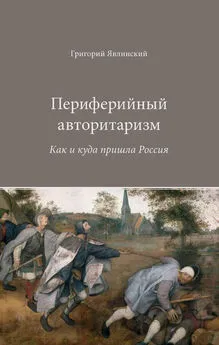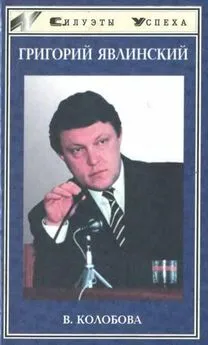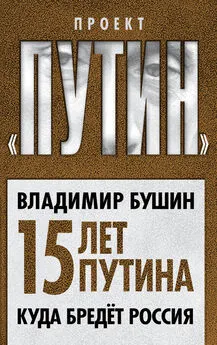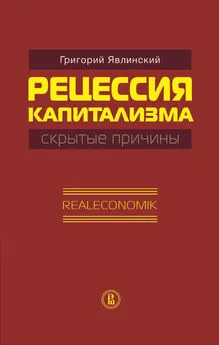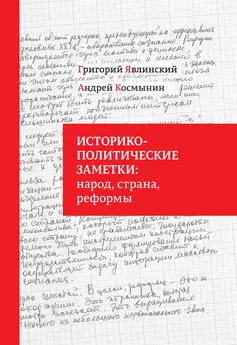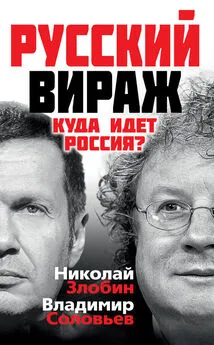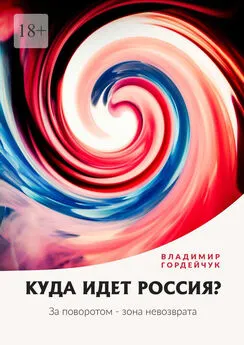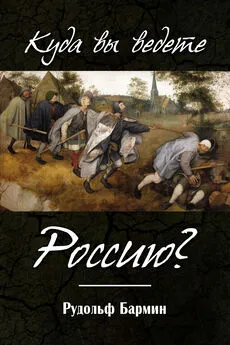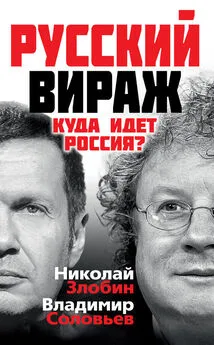Григорий Явлинский - Периферийный авторитаризм. Как и куда пришла Россия
- Название:Периферийный авторитаризм. Как и куда пришла Россия
- Автор:
- Жанр:
- Издательство:Литагент «Московские ведомости»6401ab15-165c-11e5-b4ea-002590591ed2
- Год:2015
- Город:Москва
- ISBN:978-5-85600-824-0
- Рейтинг:
- Избранное:Добавить в избранное
-
Отзывы:
-
Ваша оценка:
Григорий Явлинский - Периферийный авторитаризм. Как и куда пришла Россия краткое содержание
Книга посвящена анализу особенностей российской политической системы, причин и путей ее формирования. В представленной читателям работе автор подробно исследует российский периферийный авторитаризм, предлагает прогноз развития системы и варианты выхода из политического кризиса. Книга продолжает ряд ранее опубликованных работ автора, посвященных периферийному капитализму.
Книга предназначена для широкого круга читателей, интересующихся судьбой России.
Периферийный авторитаризм. Как и куда пришла Россия - читать онлайн бесплатно ознакомительный отрывок
Интервал:
Закладка:
The reasons for that are plentiful, but one important factor, which is stressed in this book as being of utmost importance, is that contemporary Russia that emerged on the ruins of a former communist superpower is a peripheral and subordinated part of the global capitalist civilization, of its economy, technologies and politics.
Russia’s role in the global economy is limited to that of a supplier of hydrocarbons (and a small portion of other primary products) to more advanced and wealthy nations, with little chance of breaking the vicious circle oflow position, poor efficiency and low status. The result is an almost complete absence of sovereign business class, self-conscious and independent from government bureaucracy, which would be eager to integrate itself into global business aristocracy. Hence little motivation can be expected in the Russian political class to change domestic political and business rules in order to gain competitive power and international advantages.
The drive towards fully-fledged autocracy has been made easier by the weak political position of the country and its low economic status. Lack of powerful economic and political leverage intensifies Russia’s frictions with global political leaders, who tend to impose their will on the rest of the world. The resulting frustration nourishes authoritarian political trends and the forces promoting them while undermining the position of those advocating an open and free political system.
Moreover, the psychological heritage of a former superpower’s past glory and fancy ideas of a global mission come into unbearable contradiction with Russia’s dependent and subordinate position within the global hierarchy. That makes the Russian elite resent the rules being imposed on it by the established world leaders as well as those who are trying to do it. Putin’s anti-Western mood stems not so much from his personal views and tastes, but rather from the general sense of discomfort of the entire Russian establishment, aspiring to join the upper ranks of the world elite but failing to produce solid good reason to demand that.
The recent crisis in Russia-Ukraine and Russia-West relations should be analyzed with a broader view of the changing situation in Russia. In fact, it is only a piece of a bigger puzzle, an outer extension of deep divisions and frustrations tormenting the collective mind of the Russian political class.
It is true that major decisions in the Russian government system are made at the very top. Nevertheless, the top relies on reports from a broader range of administrators and functionaries who form the mood and presuppose the range of possible decisions. Political class at large is not a passive recipient of decisions made at the top – rather it determines their direction and range.
An acute and menacing crisis in Russia’s relations with the West resulting from Putin’s rejection of rules of behavior which are considered by the West to be universal and obligatory, is to a large degree his personal choice reflecting his personal vision. Nevertheless, the decision was not completely personal and free – it came in the logic of consolidating the autocratic government system which made systemic break with the West inevitable. Moreover, the need for consolidation of the system came out of its obvious inability to solve the problems Russia faces.
The control of the very top over the entire system, its governability and sense of stability have been undermined by a sharp reduction of growth rates and mounting difficulties in extracting dictatorial rent from the economy to be distributed among the privileged bureaucracy and thus uphold the autocratic rule. That produced the need to find new instruments to consolidate the system like more official indoctrination and control over media, accentuating real and imaginary dangers from external and internal “enemies”, fostering the feeling of being victimized by a hostile world.
Hence, the situation could not be reversed easily by a single decision, even if Putin were prepared to make it. To turn the tide back, systemic changes in the mindset and world vision of the Russian political class are a necessary condition. This is a fundamentally difficult task that would take years to solve, but there is no other way to achieve a lasting settlement. Attempts to solve the issue by sanctions and private deals with Putin will be short-lived and ultimately fruitless. The only practical way to prevent Russia from fundamentally isolating itself from the West is to make it choose a difficult and painful road of converging with the mainstream of global capitalism and adapting to its realities and to wage an honest dialogue with the Russian political class at large.
Автор выражает признательность за поддержку при подготовке книги, участие в обсуждении и редактировании рукописи В.В. Когану-Ясному, В.Г. Швыдко, А.В. Космынину, а также редактору Ю.А. Здоровову.
Примечания
1
См. об этом, в частности, «Вопросы экономики». № 9. 2007. С. 19-26.
2
Желающие могут, например, обратиться к статье С. Гуриева и О. Цывинского «Ratio economica: Демократичный кризис», где дается далеко не полный, но обширный перечень таких гипотез («Ведомости», 28.08.2012, №161 (3175)).
3
Такого рода авторитарные режимы, иногда называемые в западной литературе «диктатурой развития», в ХХ веке рассматривались ими самими как попытка вырвать свои страны из мирового пояса отсталости и попытаться приблизиться к развитому ядру мировой системы или даже войти в него. Одной из таких диктатур можно, по-видимому, считать и СССР, по крайней мере на некоторых этапах его исторического пути.
4
Роберт Ауманн. «Я не уверен, что демократия более эффективна». Интервью / «Ведомости», 03.07.2012, №121 (3135).
5
Acemoglu D., Robinson J.A. Economic Origins of Dictatorship and Democracy. Cambridge, Mass.: Harvard University Press, 2006; Idem. Why Nations Fail: The Origins of Power, Prosperity and Poverty. London: Profile, 2012.
6
Договор об экономическом союзе независимых государств – бывших союзных республик, предполагавший сохранить общую денежную систему, создать зону свободной торговли, общее таможенное пространство, сохранить кооперацию предприятий, скоординировать экономическое законодательство и т.п., был подготовлен мною осенью 1991 года и подписан в Кремле на высшем уровне с участием М.С. Горбачёва и представителей руководства 13 бывших союзных республик, в том числе Украины и Казахстана (кроме Азербайджана и Грузии). Балтийские государства подписали Договор в качестве наблюдателей. Были подготовлены и согласованы с правительствами – подписантами Договора более 60 нормативных актов, реализующих экономический Договор. Беловежские соглашения сделали невозможным продолжение этой работы.
7
В этой связи стоит заметить (в более общем плане), что смысл выборов как института очень сильно зависит не только от честности самой процедуры (хотя она, безусловно, важна), но и от того, что является их итогом; от того, как меняется в их результате картина власти. Одна ситуация – когда результатом является определенная, но не кардинальная подвижка в соотношении сил во власти. То есть победившая на выборах команда получает возможность заполнить своими людьми определенные административные посты, но не получает в свои руки всю власть в системе – проигравшие силы сохраняют свои позиции в других ветвях и на других уровнях государственной власти; возможность пользоваться информационно-пропагандистскими ресурсами; результативно оспаривать решения победившей команды в судебных инстанциях и т.д. И совсем другое дело, если победивший получает все, не оставляя ничего побежденному. То есть формально единый институт – выборы – может скрывать за собой принципиально различные принципы организации власти в обществе.
8
Явлинский Г.А. «Рецессия капитализма – скрытые причины». Realeconomik. С. 119—167. М.: НИУ «Высшая школа экономики», 2014.
9
Grigory Yavlinsky. Realeconomik. The Hidden Cause of the Great Recession (And How To Avert the Next One). Yale University Press, 2011.
10
С начала 2000-х годов в российскую систему стали поступать в очень существенных размерах сверхдоходы от экспорта сырья и углеводородов, что кардинально усилило и ускорило процесс ее консолидации. Перечислим наиболее существенные этапы:
• подчинение всех политически влиятельных СМИ государству (разгром НТВ, 2000—2002 гг.);
• укрепление слияния власти и собственности путем еще большего подчинения бизнеса государству, жесткий личный контроль всех финансовых потоков, сокращение частного сектора в экономике (дело ЮКОСА, с 2003 г.);
• лишение региональных элит какой бы то ни было самостоятельности – отмена губернаторских выборов (2002 г.);
Читать дальшеИнтервал:
Закладка:
